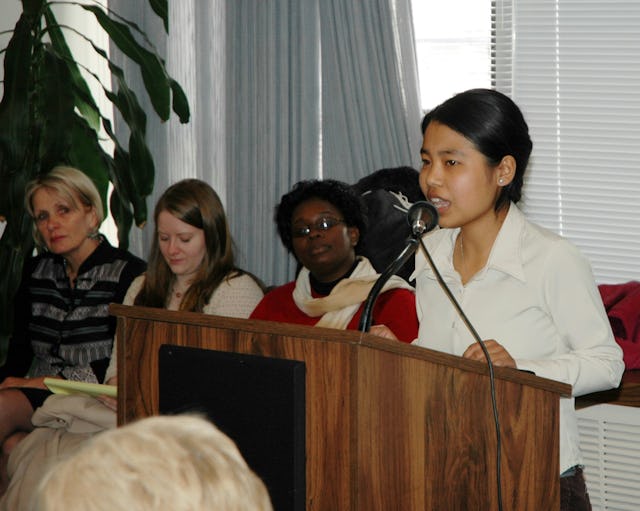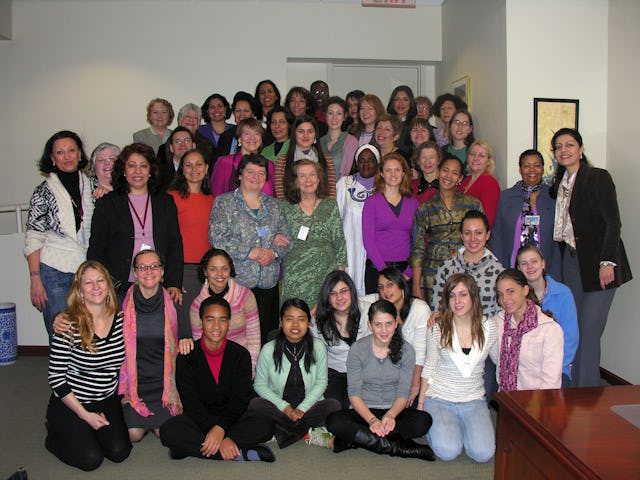Baha'i women and girls "active and dynamic" at UN women's meeting
UNITED NATIONS, United States — Last autumn, Anisa Fadaei started a discussion group on women's issues at her high school. Meeting every two weeks at lunch, about a dozen girls discuss issues like domestic violence, unequal pay rates, and trafficking in girls.
The topics were unfamiliar to most of the participants, which is the point.
"Before we started, most of the others didn't have a clue about gender equality issues or violence against women," said Anisa, who is 17 and lives in the town of Stroud, in Gloucestershire, United Kingdom. "We live in quite a nice area and so most of my friends didn't realize that such problems with inequality were going on around the world."
Though young, Anisa is committed to raising awareness about gender issues. She is involved in the youth caucus of the UK National Alliance of Women's Organizations, and she has been the featured speaker at several school-wide assemblies on women's topics. She was recently profiled in a UNICEF newsletter that focuses on how young people can get involved with global issues.
Anisa was one of at least 12 girls and 36 women and men from 27 countries who came to represent their national Baha'i communities at the 2007 UN Commission on the Status of Women (CSW), which ended on 9 March. The group represented the largest delegation of Baha'is ever at the annual meeting of the Commission, which has in recent years become a global rallying point for activists on women's issues.
An examination of the Baha'i delegation offers a snapshot of how Baha'is around the world are striving in their local and national communities to promote the equality of women and men, which is a basic principle of the Baha'i Faith.
Among those attending the Commission this year, for example, were:
-- Ahenleima Koijam, a 16-year-old student from Imphal, India, who has been working with children and youth groups since 2003, and has also participated in a public hearing on human rights, where she talked about problems facing girls in the province of Manipur.
-- Mitra Deliri, a 48-year-old teacher who recently founded a school for underprivileged girls in Dar Es Salaam, Tanzania. The school, the Chipua Institute for Social Transformation, tutors some 70 girls in English, math, and science, and also vocational skills.
-- Ruth Montgomery-Anderson, a 49-year-old midwife from Greenland, who has recently completed several films for the Ministry of Health on issues that touch the lives of women in Greenland. One film, for example, explores family life in Greenland, while another discusses issues of rape and sexual abuse.
-- Jutta Bayani, a 52-year-old businesswoman from Mamer, Luxembourg, who was recently appointed by her city's mayor to a consultative commission on gender issues. "The appointment came, I believe, as a result of my longstanding involvement in women's activities, especially at the national level," said Ms. Bayani.
"The United Nations is looking for models about how to implement its various programs, and in the case of these Baha'i women from around the world you have some concrete examples of effective activities at the local and national levels to promote the advancement of women," said Fulya Vekiloglu, director of the Baha'i International Community's Office for the Advancement of Women.
This year's Commission meeting drew nearly 2,000 people, representing some 334 organizations. Among them were some 200 girls from around the world, a response to the theme of this year's Commission, which was "The elimination of all forms of discrimination and violence against the girl child."
In addition to the main meeting by governments to discuss that theme and other issues, the UN, government missions, and non-governmental organizations (NGOs) sponsored more than 170 "parallel events" - panel discussions, workshops, briefings and other activities aimed at exploring issues facing women and girls around the globe.
"The Baha'i delegation's participation in all aspects of the Commission was active and dynamic," said Ms. Vekiloglu, who is also one of the Community's representatives to the United Nations. "The delegates were observers in official meetings, speakers in panel discussions, and active members of various caucuses. They also made many interventions in workshops, presenting Baha'i perspectives and experiences at the grassroots level."
Ahenleima Koijam, the girl from India, for example, was a featured panelist at a workshop titled "Gender-Based Violence: Consequences Across the Life Span," held on 1 March at the UN Church Center.
Side by side with older women from around the world, many of them acknowledged experts, Ahenleima told the audience about the conditions faced by women and girls in rural areas outside Imphal.
"Many girls are forced to get married at an early age," said Ahenleima, saying that girls face various forms of violence, both physical and psychological, even from before birth. "Early marriage often results in the birth of a low-weight child. Fifty-six percent of girls suffer from anemia, and 40 percent suffer from stunted growth."
Ahenleima's answer to this and other problems was to increase support for education, especially for girls. "A girl's most important influence is on her family," noting that even when young girls have children, their role in raising the next generation is nevertheless powerful. "The mothers need to be educated properly, as they are the first line of educators."
Other activities that featured specific involvement by Baha'is included a 2 March panel discussion on "Ethical Perspectives on Transitional Justice and the Girl Child," which was sponsored by the UN office of the Baha'i community of the United States; a 25 February workshop on CEDAW (Convention on the Elimination of all Kinds of Discrimination Against Women) and the CRC (Child Rights Convention), which was moderated by Ms. Vekiloglu; and a 2 March "Girls' Perspective" meeting with Yakin Erturk, the UN Special Rapporteur on Violence against Women, which was held at the Baha'i International Community's offices.
"I think the meeting with Yakin Erturk, which gave her and other UN officials a chance to hear directly from girls, really captured the spirit of the Commission this year, with its focus on girls and their concerns," said Ms. Vekiloglu, noting that the meeting was co-sponsored by the Community and the NGO Committee on UNICEF's Working Group on Girls.
Ms. Vekiloglu also said the Baha'i delegation held a one-day planning session during the Commission to discuss how Baha'is can further promote the advancement of women in their own countries. "We looked at what Baha'is are doing in their regions, and also what they can do in the future," said Ms. Vekiloglu.
Anisa Fadaei, the Baha'i girl from Stroud, participated in a panel discussion on 1 March titled "Eliminating Violence across Generations." Held in the Dag Hammarskjold Auditorium at the UN building, the discussion featured not only Anisa but also her mother, Zarin Hainsworth Fadaei, and her grandmother, Lois Hainsworth. The event was sponsored by the Permanent Mission of the United Kingdom to the UN and the Baha'i International Community, and also featured a performance of the Children's Theater Company.
In her presentation, Anisa stressed the need for young women to educate their male peers about the equality of women and men.
"We need to tell more boys what is going on," said Anisa, when asked by someone in the audience about how to promote the kinds of social changes need to end violence against women and to promote their advancement. "For me, personally, we need to raise awareness."

